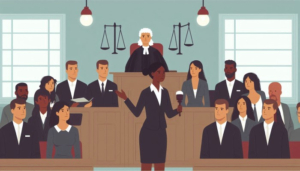
Discover the future of copyright law in the digital world. Explore challenges, technological impacts, and emerging trends shaping copyright protections and reforms.
Introduction
Overview of Copyright Law
Copyright law is a set of legal protections granted to creators of original works, like books, music, films, and software. It ensures that creators can control how their works are used and benefit financially from their creations. Copyright law has been around for centuries, evolving from early legal protections in print to complex regulations in the digital age.
Importance of Copyright in the Digital Age
In our digital world, copyright law is crucial. It safeguards the rights of creators and ensures they get compensated for their work. With the rise of the internet and digital media, the importance of copyright has surged. It influences everything from how content is shared online to how creators earn a living from their work.
Purpose of the Article
This article explores how copyright law is adapting to the digital world. We’ll look at current challenges, major legal developments, and future directions. The aim is to provide a comprehensive understanding of how copyright law is evolving and what it means for creators, consumers, and businesses.
The Digital Transformation of Copyright
Impact of Digital Technology
Digital technology has revolutionized how we create, share, and consume content. The internet has made it easier than ever to distribute digital media, but it’s also introduced new issues for copyright. Digital reproduction means that content can be copied and shared almost instantaneously, raising concerns about unauthorized use and piracy.
Evolution of Copyright Issues
As media has transitioned from physical formats to digital, copyright issues have become more complex. Traditional laws designed for physical goods now have to address challenges unique to digital content, such as instant replication and global distribution. These changes have prompted ongoing debates about how to update copyright law to better fit the digital landscape.
Key Challenges Facing Copyright Law Today
Piracy and Unauthorized Distribution
Piracy is a significant issue in the digital world. Platforms that facilitate file sharing have led to widespread unauthorized distribution of copyrighted content. This not only affects creators’ income but also raises questions about how to enforce copyright protections effectively in a digital environment.
Digital Rights Management (DRM)
Digital Rights Management (DRM) technologies are used to control how digital content is accessed and used. While DRM can help protect against unauthorized use, it often faces criticism for being restrictive and inconvenient for legitimate users. The effectiveness of DRM remains a topic of debate, with ongoing discussions about its impact on both creators and consumers.
Globalization and Jurisdiction Issues
The internet’s global reach means that copyright enforcement often involves complex jurisdictional issues. Different countries have varying copyright laws, making it challenging to enforce rights across borders. There’s a growing need for international cooperation and harmonization of copyright laws to address these challenges effectively.
User-Generated Content and Fair Use
Platforms like YouTube and TikTok have transformed how we create and share content. These platforms often involve user-generated content that may use copyrighted material. Balancing the rights of original creators with the freedoms of users and innovators is a key challenge for copyright law in the digital age.
Major Legal Developments and Case Studies
Notable Copyright Cases
Several landmark copyright cases have shaped the current legal landscape. For instance, the landmark case of Google LLC v. Oracle America, Inc. addressed the use of Java code in Android and had significant implications for software copyright. These cases help establish legal precedents that influence how copyright laws are interpreted and applied.
Legislative Changes
Recent updates to copyright legislation reflect the need to address digital challenges. For example, the Digital Millennium Copyright Act (DMCA) has been a key piece of legislation in the U.S., impacting how copyright issues are handled online. International agreements, like the Berne Convention, also play a role in shaping copyright laws globally.
Case Studies of Digital Rights Violations
High-profile examples of digital rights violations, such as the shutdown of the Pirate Bay, highlight ongoing issues with enforcing copyright online. These cases provide insights into the challenges of managing digital rights and the effectiveness of various enforcement strategies.
The Role of Technology in Shaping Copyright Law
Blockchain Technology
Blockchain technology offers a potential solution for copyright protection by providing a transparent and immutable record of ownership. It can help track the distribution of digital content and ensure creators are compensated fairly. However, there are still challenges to overcome, such as integrating blockchain with existing legal frameworks.
Artificial Intelligence and Copyright
AI-generated content raises new questions about copyright ownership. When an AI creates a piece of work, who owns the rights? The legal system is still grappling with these issues, and new regulations may be needed to address the complexities introduced by AI.
Digital Platforms and Copyright Management
Social media platforms and digital content distributors play a significant role in managing copyright. These platforms use various methods for content moderation and copyright enforcement, but their effectiveness can vary. Understanding how these platforms handle copyright issues is crucial for both creators and consumers.
Future Directions for Copyright Law
Potential Reforms and Innovations
As technology continues to evolve, copyright law may need to undergo significant reforms. Proposed changes could include updates to existing laws or entirely new frameworks designed to address emerging challenges. Innovations in technology, like blockchain and AI, may also drive new approaches to copyright protection.
The Role of International Cooperation
International cooperation is essential for addressing global copyright issues. Efforts to harmonize copyright laws and improve cross-border enforcement mechanisms can help create a more cohesive approach to managing digital rights. Global initiatives and agreements will play a critical role in shaping the future of copyright law.
Balancing Creator Rights and Public Access
Striking a balance between protecting creators’ rights and ensuring public access to content is a key challenge. Reforms may focus on creating flexible frameworks that allow for fair use while still providing adequate protection for creators. Open access movements and alternative licensing models may also influence future developments in copyright law.
The Impact of Copyright Law on Different Stakeholders
Creators and Artists
For creators and artists, copyright law is a vital tool for protecting their work and ensuring they are compensated for their creations. However, digital challenges, such as piracy and unauthorized distribution, can impact their earnings. Understanding how copyright law affects these stakeholders is essential for addressing their concerns and needs.
Consumers
Consumers benefit from access to a wide range of digital content, but copyright enforcement can sometimes lead to restrictions on their usage. The impact of copyright law on consumer rights and access to content is an important consideration for balancing the interests of both creators and users.
Businesses and Technology Providers
Businesses and technology providers have legal obligations related to copyright, including managing and enforcing rights on their platforms. These obligations can affect business models and operational practices. Understanding how copyright law impacts these stakeholders is crucial for navigating the digital landscape.
Case Studies of Emerging Trends
Music Industry and Streaming Services
The music industry has been significantly affected by the rise of streaming services. Copyright challenges, such as licensing agreements and revenue distribution, are central issues. Case studies of major streaming platforms provide insights into how the industry is adapting to digital changes.
Publishing and Digital Content
The publishing industry faces unique copyright challenges with the rise of e-books and online articles. Copyright management strategies, including digital rights management and licensing models, play a critical role in addressing these issues.
Film and Entertainment Industry
Digital distribution has transformed the film and entertainment industry, presenting new copyright challenges. High-profile legal cases and emerging trends in content distribution highlight the ongoing evolution of copyright law in this sector.
Expert Opinions and Interviews
Insights from Legal Experts
Interviews with copyright lawyers and legal experts provide valuable perspectives on the future of copyright law. Their insights into current challenges and potential reforms can help shape a more informed understanding of the evolving legal landscape.
Views from Creators
Interviews with artists and content creators offer a firsthand look at how copyright law impacts their work. Their experiences and opinions can shed light on the practical implications of copyright protections and enforcement.
Conclusion
In summary, copyright law is undergoing significant changes in response to the digital revolution. Key challenges include piracy, DRM effectiveness, and global jurisdiction issues. Technological advancements and international cooperation will play crucial roles in shaping the future of copyright law.
To stay informed and engaged with the evolving landscape of copyright law, it’s important to continue learning and advocating for necessary reforms. Understanding the impact of these changes on creators, consumers, and businesses is crucial for navigating the digital world effectively.






